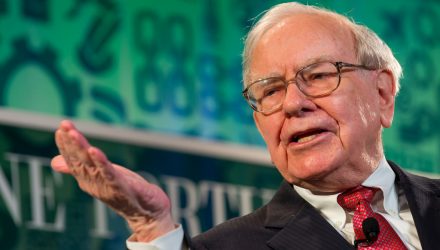Here are some highlights of Warren Buffett’s widely-anticipated annual letter to Berkshire Hathaway shareholders:
Format Change
While for thirty years the billionaire investing legend has opened with a paragraph concerning the change in the firm’s per-share book value, this year he wrote, “It’s now time to abandon that practice,” citing three reasons for the change:
- Berkshire has “gradually morphed from a company whose assets are concentrated in marketable stocks into one whose major value resides in operating businesses;”
- Although the firm’s equity holdings are valued at market prices, accounting rules require Berkshire’s operating companies to be included in book value at an amount “far below their current value, a mismark that has grown in recent years;”
- There is an increased likelihood Berkshire “will be a significant repurchaser of its shares, transactions that will take place at prices above book value but below our estimate of intrinsic value.”
Berkshire Earnings
Instead, Buffett opens the letter citing Berkshire’s GAAP earnings of $4 billion in 2018, broken down as follows:
- Operating earnings: $24.8 billion;
- Non-cash loss related to intangible assets: $3.0 billion;
- Realized capital gains: $2.8 billion
- Loss from unrealized capital gains in investment holdings: $20.6 billion (Buffett notes that a new GAAP rule requires this to be reported).
Buffett suggested that shareholders “Focus on operating earnings, paying little attention to gains or losses of any variety,” adding that his advice , “in no way diminishes the importance of our investments to Berkshire. Over time, Charlie and I expect them to deliver substantial gains, albeit with highly irregular timing.”
He notes that, while markets can be “extremely capricious,” Berkshire’s stock price will provide the best measure of business performance.
Management Changes
In 2018, Buffett writes, Ajit Jain was put in charge of all insurance activities and Greg Abel was given authority over all other operations. “Berkshire is now far better managed than when I alone was supervising operations. Ajit and Greg have rare talents,” he adds, “and Berkshire blood flows through their veins.”
Berkshire Holdings
Buffett offers an in-depth evaluation of Berkshire’s holdings, while advising readers to “focus on the forest—forget the trees.” He argues that spending too much time analyzing the details of the conglomerate’s businesses can be “mind-numbing.” At Berkshire, he asserts, “the whole is greater—considerably greater—than the sum of the parts.”
Buffett delves into the firm’s stock repurchase plans, its reporting practices, the float derived from insurance operations, Berkshire’s non-insurance-related operations, and the passing of the baton at GEICO from Tony Nicely to his successor, Bill Roberts.
The American Tailwind
Once again, the billionaire investing legend closes his letter with a nod to the American economy and its strength, highlighting our country’s resilience and tenacity over its long and volatile history. He writes, “Charlie and I happily acknowledge that much of Berkshire’s success has simply been a product of what I think should be called The American Tailwind,” and contends that while many other countries across the globe face promising futures,” over the next century the majority of Berkshire’s gains will be derived from American businesses. “We are lucky—gloriously lucky,” he writes, “to have that force at our back.” Citing Berkshire’s strong businesses, copious cash-generation, talented management and “rock-solid culture,” Buffett concludes that Berkshire is “in good shape for whatever the future brings.”
For more market trends, visit ETF Trends.
